De Vlaamse dichter Jan Lauwereyns werd geboren op 13 mei 1969 in Antwerpen. Zie ook alle tags voor Jan Lauwereyns op dit blog.
Een italiaanse haven
Enkele wolken, een karveel, drie streepjes
zon uit het oosten, en een vloer met geen
twee tegels naast elkaar in dezelfde kleur.
Een windhond met snuit landinwaarts. Ik
meen mij ook een kromgetrokken zwaard
te herinneren. Mijn glimmend harnas ligt
naast me. Ik knikkebol.
Jij bent het aapje dat op mijn schouder zit,
dat met de linkerbakkebaard mijn rechter-
oorschelp kietelt. In de zware koffer met
koperen sloten steken vier dichtbundels en
twee cd’s en – want wat goedkoper hier –
een voorraad zachte lenzen.
Foto met vogels
De wolken boven het IJsselmeer doen
het licht aan en uit op de scherptediepte
die je voor mij nodig hebt. Tegen je
gehemelte plakt het zwart van drop.
Het smaakt naar zeewier uit het verre
oosten laten je wangen weten. Je rekent
wat je kan maar hebt, zeg je, tussen niets
en het silhouet van een handvol spreeuwen
te kiezen.
Vier van de gekwelde vogels zitten nog steeds
naar het westen te kijken. De vijfde zal altijd
verder vliegen dan de vastgelegde vleugelslag.
Automorf
Tot de dag ervoor kende
de maagd, een wiskundige, het axioma
van zijn zelfmoord nog niet.
‘Misschien is er iemand’, vermoedde het briefje
dat hij achterliet op zijn werktafel.
Zij moest ook gaan, een cliché,
om hem te vervoegen.
Een krakkemikkige houten constructie,
zonnewind.
‘O, was ik daarbij toen?’
Zijn blauwgroen pak had een vreemde
metalige schijn.
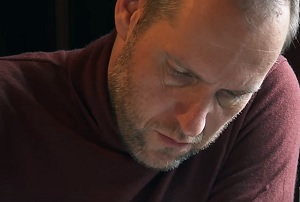
Jan Lauwereyns (Antwerpen, 13 mei 1969)
De Vlaamse dichter Reinout Verbeke werd geboren op 13 mei 1981 in Roeselare. Zie ook alle tags voor Reinout Verbeke op dit blog.
Oorloglozen
De graven: aanvalsboten
in een zee van gras wachten
op het afgesproken teken
van leven
Dan slepen we soldaten aan
in de steriele kamers van het woord
stelpen bloed met printpapier
het zelfoplossend hechtkoord
van de aandacht
Wij zijn oorloglozen. Onze aderen
ondergelopen loopgraven. Op onze tongen
landen geen verhalen
Waterboard de werkelijkheid
en ze bekent: de dag is een witte vlag
Er wordt wild van man tot vrouw gezwaaid
‘s Nachts tasten we naar de helm onder de schedel
de bajonet in de onderarm. We trekken voren in het gras
lopen als hamsters de vijand tegemoet
Het geluid van het gedicht
Het geluid van het gedicht
is het geluid van andere vogels
van andere dieren, andere machinerieën
Het geluid van het gedicht
is de Australische liervogel
die twee eksters nadoet een gele mus
die zijn jongen voedt een parkiet
in de vlucht een digitale reflexcamera
een autoalarm
Het geluid van het gedicht
is de liervogel die een hydraulische ram
imiteert het gefluit van de werkman
de kettingzaag die zich
een weg baant, een boom
die valt
Het geluid van het gedicht
is de liervogel die de dood
op zijn stembanden heeft gezet

Reinout Verbeke (Roeselare, 13 mei 1981)
De Engelse schrijver Bruce Chatwin werd op 13 mei 1940 in Sheffield geboren. Zie ook alle tags voor Bruce Chatwin op dit blog.
Uit: The Songlines
“One year, an anthropologist from Canberra came to study Walbiri systems of land tenure: an envious academic who resented Arkady’s friendship with the song-men, pumped him for information and promptly betrayed a secret he had promised to keep. Disgusted by the row that followed, the ‘Russian’ threw in his job and went abroad. He saw the Buddhist temples of Java, sat with saddhus on the ghats of Benares, smoked hashish in Kabul and worked on a kibbutz. On the Acropolis in Athens there was a dusting of snow and only one other tourist: a Greek girl from Sydney. They travelled through Italy, and slept together, and in Paris they agreed to get married. Having been brought up in a country where there was ‘nothing’, Arkady had longed all his life to see the monuments of Western civilisation. He was in love. It was springtime. Europe should have been wonderful. It left him, to his disappointment, feeling flat. Often, in Australia, he had had to defend the Aboriginals from people who dismissed them as drunken and incompetent savages; yet there were times, in the flyblown squalor of a Walbiri camp, when he suspected they might be right and that his vocation to help the blacks was either wilful self-indulgence or a waste of time. Now, in a Europe of mindless materialism, his ‘old men’ seemed wiser and more thoughtful than ever. He went to a Qantas office and bought two tickets home. He was married, six weeks later in Sydney, and took his wife to live in Alice Springs. She said she longed to live in the Centre. She said she loved it when she got there. After a single summer, in a tin-roofed house that heated like a furnace, they began to drift apart. The Land Rights Act gave Aboriginal ‘owners’ the title to their country, providing it lay untenanted; and the job Arkady invented for himself was to interpret ’tribal law’ into the lan-guage of the Law of The Crown. No one knew better that the ‘idyllic’ days of hunting and gathering were over — if, indeed, they were ever that idyllic. What could be done for Aboriginals was to preserve their most essential liberty: the liberty to remain poor, or, as he phrased it more tactfully, the space in which to be poor if they wished to be poor. Now that he lived alone he liked to spend most of his time ‘out bush’.
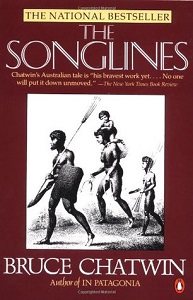
Bruce Chatwin (13 mei 1940 – 18 januari 1989)
Cover
De Britse schrijfster Daphne du Maurier werd geboren in Londen op 13 mei 1907. Zie ook alle tags voor Daphne du Maurier op dit blog.
Uit: Jamaica Inn
„Little by little her stock had decreased, and with times being bad—so she was told in Helston—and prices fallen to nothing, there was no money anywhere. Upcountry it was the same. There would be starvation in the farms before long. Then a sickness attacked the ground and killed the livestock in the villages round Helford. There was no name to it, and no cure could be discovered. It was a sickness that came over everything and destroyed, much as a late frost will out of season, coming with the new moon and then departing, leaving no trace of its passage save the little trail of dead things in its path. It was an anxious, weary time for Mary Yellan and her mother. One by one they saw the chickens and the ducklings they had reared sicken and die, and the young calf fell in the meadow where he stood. The most pitiful was the old mare who had served them twenty years, and upon whose broad and sturdy back Mary had first straddled her young legs. She died in the stall one morning, her faithful head in Mary’s lap; and when a pit was dug for her under the apple tree in the orchard, and she was buried, and they knew she would no longer carry them to Helston market day, Mary’s mother turned to her and said, “There’s something of me gone in the grave with poor Nell, Mary. I don’t know whether it’s my faith or what it is, but my heart feels tired and I can’t go on any more.”
She went into the house and sat down in the kitchen, pale as a sheet, and ten years her age. Listless, she shrugged her shoulders when Mary said she would fetch the doctor. “It’s too late, child,” she said, “seventeen years too late.” And she began to cry softly, who had never cried before.
Mary fetched the old doctor who lived at Mawgan and who had brought her into the world, and as he drove her back in his trap he shook his head at her. “I tell you what it is, Mary,” he said; “your mother has spared neither her mind nor her body since your father died, and she has broken down at last. I don’t like it. It’s come at a bad time.”
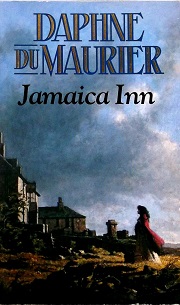
Daphne du Maurier (13 mei 1907 – 19 april 1989)
Cover
De Schotse dichteres Kathleen Jamie werd geboren op 13 mei 1962 in Currie, Edinburgh. Zie ook alle tags voor Kathleen Jamie op dit blog.
The Wishing Tree
I stand neither in the wilderness
nor fairyland
but in the fold
of a green hill
the tilt from one parish
into another.
To look at me
through a smirr of rain
is to taste the iron
in your own blood
because I hoard
the common currency
of longing: each wish
each secret assignation.
My limbs lift, scabbed
with greenish coins
I draw into my slow wood
fleur-de-lys, the enthroned Brittania.
Behind me, the land
reaches toward the Atlantic.
And though I’m poisoned
choking on the small change
of human hope,
daily beaten into me
look: I am still alive—
in fact, in bud.
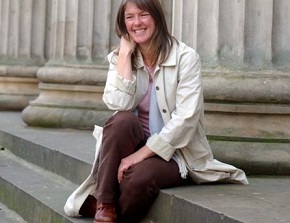
Kathleen Jamie (Currie, 13 mei 1962)
De Amerikaanse schrijver Armistead Jones Maupin Jr. werd geboren op 13 mei 1944 in Washington. Zie ook alle tags voor Armistead Maupin op dit blog.
Uit: Mary Ann in Autumn
“Wo blocks away, while looking for lunch, she found the corner mom-and-pop still intact, still called the Searchlight Market. Next door her old Laundromat had been stylishly renovated and a little too cutely renamed “The Missing Sock.” It pleased her to find the original thirties’ lettering still silvering the plate glass at Woo’s Cleaners, though the place was obviously empty. The windows were blocked by pale blue wrapping paper, the very paper her laundry had once been wrapped in. Across the street, a pristine gallery of tiny objets had sprouted next to what had once been Marcel & Henri, the butcher shop where she had sometimes splurged on pâté, just to keep from feeling like a secretary.
And there was Swensen’s, the ice cream shop at Hyde and Union that had been her consolation on more than one Saturday night when she had stayed in with Mary Tyler Moore. This was the original Swensen’s, the one Mr. Swensen himself had opened in the late forties, and he had still been running it when she was here. She was about to stop in for a cone, just for old times’ sake, when she spotted the fire trucks parked on Union.
Rounding the corner, she found dozens of onlookers assembled beneath a big sooty hole on the second floor of a house. The crisis seemed to have passed; the air was pungent with the smell of wet embers, and the firemen, though obviously weary, were business-as-usual as they tugged at a serpentine tangle of hoses. One of the younger ones, a frisky Prince Harry redhead, seemed aware of his lingering audience and played to the balcony with every manly move.
We do love our firefighters, she thought, though she had long ago forfeited her right to the Municipal We. She was no more a San Franciscan now than the doughy woman in a SUPPORT OUR TROOPS
sweatshirt climbing off the cable car at the intersection. She herself hadn’t used a cable car for years, yet every handrail and plank was as vividly familiar as her first bicycle. This one had a light blue panel along the side, marking it as a Bicentennial model. They were built the year she’d arrived in the city.”
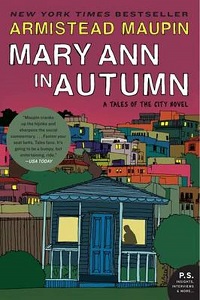
Armistead Maupin ( Washington, 13 mei 1944)
Cover
De Franse dichter en schrijver Alphonse Daudet werd geboren in Nîmes op 13 mei 1840. Zie ook alle tags voor Alphonse Daudet op dit blog.
Uit: Les lettres de mon moulin
“Ce sont les lapins qui ont été étonnés !… Depuis si longtemps qu’ils voyaient la porte du moulin fermée, les murs et la plate-forme envahis par les herbes, ils avaient fini par croire que la race des meuniers était éteinte, et, trouvant la place bonne, ils en avaient fait quelque chose comme un quartier général, un centre d’opérations stratégiques: le moulin de Jemmapes des lapins… La nuit de mon arrivée, il y en avait bien, sans mentir, une vingtaine assis en rond sur la plate-forme, en train de se chauffer les pattes à un rayon de lune… Le temps d’entrouvrir une lucarne, frrt ! voilà le bivouac en déroute, et tous ces petits derrières blancs qui détalent, la queue en l’air, dans le fourré. J’espère bien qu’ils reviendront.
Quelqu’un de très étonné aussi, en me voyant, c’est le locataire du premier, un vieux hibou sinistre, à tête de penseur, qui habite le moulin depuis plus de vingt ans. Je l’ai trouvé dans la chambre du haut, immobile et droit sur l’arbre de couche, au milieu des plâtras, des tuiles tombées. Il m’a regardé un moment avec son œil rond ; puis, tout effaré de ne pas me reconnaître, il s’est mis à faire : « Hou ! hou ! » et à secouer péniblement ses ailes grises de poussière ; — ces diables de penseurs ! ça ne se brosse jamais… N’importe ! tel qu’il est, avec ses yeux clignotants et sa mine renfrognée, ce locataire silencieux me plaît encore mieux qu’un autre, et je me suis empressé de lui renouveler son bail. Il garde comme dans le passé tout le haut du moulin avec une entrée par le toit ; moi je me réserve la pièce du bas, une petite pièce blanchie à la chaux, basse et voûtée comme un réfectoire de couvent.”
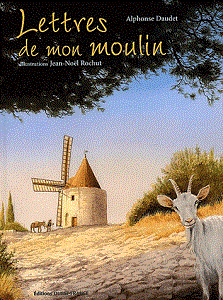
Alphonse Daudet (13 mei 1840 – 17 december 1897)
Cover
De Japanse schrijver Koji Suzuki werd geboren op 13 mei 1957 in Hamamatsu.Zie ook alle tags voor Kōji Suzuki op dit blog.
Uit: Ring (Vertaald door Robert B. Rohmer en Glynne Walley)
“She felt stifled-not exactly like she was suffocating, but like there was a weight pressing down on her chest. For some time Tomoko had been complaining to herself about how unfair life was, but now she was like a different person as she lapsed into silence. As she started down the stairs her heart began to pound for no reason. Headlights from a passing car grazed across the wall at the foot of the stairs and slipped away. As the sound of the car’s engine faded into the distance, the darkness in the house seemed to grow more intense. Tomoko intentionally made a lot of noise going down the stairs and turned on the light in the downstairs hall.
She remained seated on the toilet, lost in thought, for a long time even after she had finished peeing. The violent beating of her heart still had not subsided. She’d never experienced anything like this before. What was going on? She took several deep breaths to steady herself, then stood up and pulled up her shorts and panties together.
Mom and Dad, please get home soon,
she said to herself, suddenly sounding very girlish.
Eww, gross. Who am I talking to?
It wasn’t like she was addressing her parents, asking them to come home. She was asking someone else…
Hey. Stop scaring me. Please…
Before she knew it she was even asking politely.
She washed her hands at the kitchen sink. Without drying them she took some ice cubes from the freezer, dropped them in a glass, and filled it with coke. She drained the glass in a single gulp and set it on the counter. The ice cubes swirled in the glass for a moment, then settled. Tomoko shivered. She felt cold. Her throat was still dry. She took the big bottle of coke from the refrigerator and refilled her glass. Her hands were shaking now. She had a feeling there was something behind her. Some
thing -definitely not a person. The sour stench of rotting flesh melted into the air around her, enveloping her. It couldn’t be anything corporeal.”
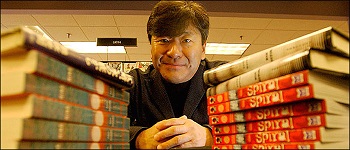
Kōji Suzuki (Hamamatsu, 13 mei 1957)
Zie voor nog meer schrijvers van de 13 mei ook mijn vorige blog van vandaag.
